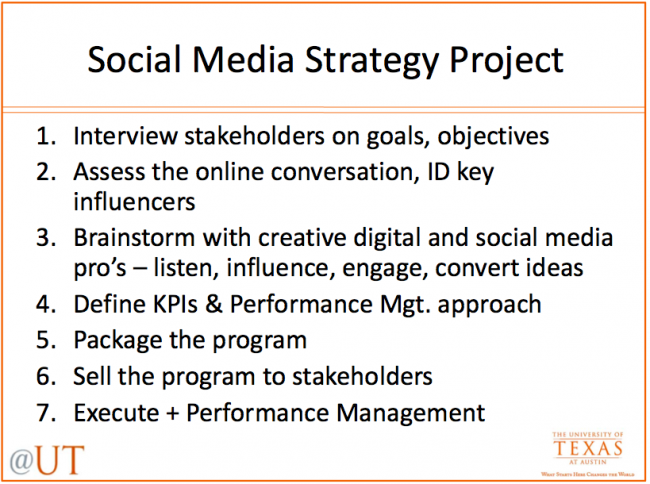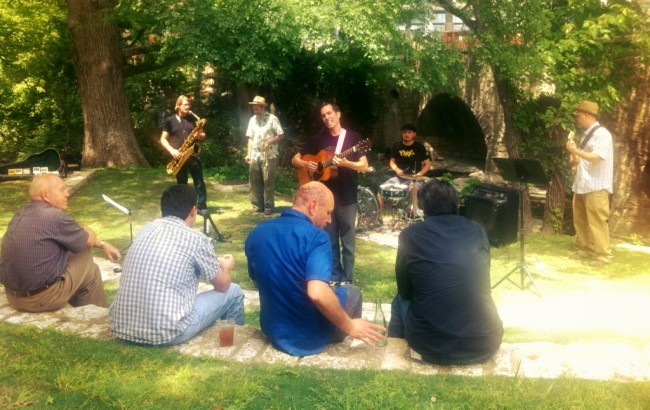Here’s a shot by Lauren of Mo, Gray, Los and I playing the new mainstage opening GregoFest last night.
The Lodge on Regulus at Whip-In 5-24-12
Girlfriend In A Coma
Here’s my first attempt to cover this Smith’s song, live from Guero’s last Saturday.
Black Studies Social Media Intro

Today I’ll be talking with a dozen or so faculty in the John L. Warfield Center for African and African American Studies. We’ve got lots of questions, so I’ll give a brief introduction and dive right into all the questions that the people who RSVP’d asked ahead of time.
Introduction
- About me
- Web presence
- Why blog?
- Some profs I worked with at McCombs
- Brand posts of mine
Questions
- Your Brand
- What are the most effective strategies to manage your brand? Know yourself, what makes you unique. Know your people, your tribe, and stay up on what they’re doing and interested, listen to them, develop a listening strategy. Share your unique expertise with your tribe. Lead them by serving them.
- How does a researcher, consultant, academic develop a brand? I like to use discovery exercises. Answer questions like these about yourself: What’s the vin diagram that describes your unique overlap of interests, talents, expertise? Who are your biggest influences? Who are your heroes? What thought leaders do you want to be associated with? What conferences does your tribe attend? Where do they meet? What media do they consume? Where do they get and share their news?
- How can a researcher, consultant, academic ensure consistency in the brand? Define it from the beginning, write it down, document it and keep it updated for yourself (and anyone who looks you up). Have goals and a strategy. Act, don’t react.
- What are the best first steps to follow in setting up a social media campaign about a project or institute? I’ve included a slide below of Paul Walker’s 7 steps to a social media strategy. Paul says spend a week on each for a 7 week process.
- Would you recommend a faculty webpage or are they obsolete? You definitely want your own site (blog, portfolio) and you want it to be the first thing that comes up in Google for your chosen name or keywords.
- What are the various/multiple forms of social media that academics should consider? What are the relative benefits of one compared to others in terms of gains? How does a person determine which to choose? What are the potential losses? What makes these pertinent to academics? It’s all about where your people are. Use whatever channels you need to meet your audience where they already are.
- How can you maintain a “scholarly” identity and still develop/fully participate in/be embraced by social media communities? How to effectively use social media in academia, but not have it consume too much time? What is overkill? What are typical pitfalls? Be systematic. Have goals, a strategy, scheduled times to document and share your progress, thoughts, news, etc. Don’t be a reactive addict. Incorporate it into what you already do instead of making it something else you have to do. Don’t use it to procrastinate or by default. Be intentional and consistent.
- How can you measure impact of social media engagement, including measurements that help chairs see the impact & value? Define what matters to you and how you can measure it (key performance indicators or KPIs). This could be quality/quantity of output and input. Posts, comments, likes, followers, views, subscribers, inquiries, references, referrals, gigs, media mentions, interviews, dollars, etc. Google analytics is a great free tool for your site. Social media channels have all sorts of built-in ways of measuring. Don’t just watch the numbers; know what you want to achieve.
- Classroom
- Using wikis and blogs to expand classroom discussion and letting the students take the lead on this? Using a blog for class is a great idea. Keep it fresh with weekly materials and give students a way of interacting, posting. Have students post and comment on others’s posts. Make it somewhere students go for what’s happening, resources, schedule, syllabus, etc. WordPress.com is an easy way. We also have blogs.utexas.edu.
- How can it be incorporated into teaching, in & out of the classroom? Integrating social media into in-class lecture and discussion? Conferences are great places to look for good interaction habits.  Use Facebook (groups) or Twitter (hashtags) to take ask questions, solicit questions or comments.Â
- Channels
- Timeliness
- How often should different social media be updated to maintain the attention of an audience?
- What forms of social media are on the front lines versus those that are being outdated?
- What is the lifespan of the respective media formats – should one remain in constant change mode to insure remaining current?
- Facebook and Twitter
- Setting up effective Facebook and Twitter pages for classes?
- What are the benefits of using twitter instead of Facebook for professional exposure?
- What privacy settings do you recommend for various social media outlets?
- How does Twitter work?
- What are the pros and cons to using Twitter specifically?
- How to utilize Twitter in an academic setting?
- Others
- What is Pinterest?
- How can academia use Reddit?
- What is Instagram and can it be a tool for academia?

UT Concert by Waller Creek Spring 2012

It was a perfect day beside Waller Creek for a lunchtime concert on the UT campus Thu April 19th. Thanks to Adam Norwood for this glowing photo and to Kati for posting a 360-video of the scene on Facebook.




